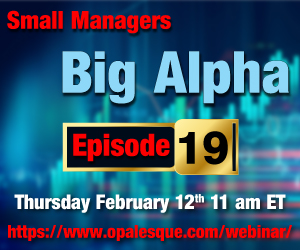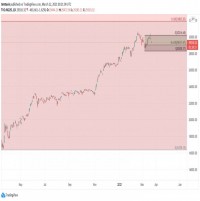|
Opalesque Industry Update - Hedge funds gained in July as recession fears mounted and volatility spiked into month-end, preceding a historic equity market drop to begin August, as inflation
fears quickly transitioned into recessions fears, geopolitical uncertainty hastened, and large cap technology equities posted steep declines. Gains in Event-Driven and Equity Hedge strategies led performance in July as the HFRI Fund Weighted Composite Index (FWC) advanced +0.8 percent for the month, according to data released today by HFR. The HFR Cryptocurrency Index surged an estimated +5.4 percent in July, increasing its YTD return to +32.1 percent. Hedge fund performance dispersion expanded in July, as the top decile of the HFRI FWC constituents advanced by an average of +8.0 percent, while the bottom decile fell by an average of -5.4 percent, representing a top/bottom dispersion of 13.4 percent for the month. By comparison, the top/bottom performance dispersion in June was 11.2 percent. In the trailing 12 months ending July 2024, the top decile of FWC constituents gained +33.1 percent, while the bottom decile declined -12.7 percent, representing a top/bottom dispersion of 45.8 percent. Approximately two-thirds of hedge funds produced positive performance in July. Event-Driven (ED) strategies, which often focus on out-of-favor, deep value equity exposures and speculation on M&A situations, led strategy performance in July, with gains driven by Activist, Merger Arbitrage, and Distressed exposures, as investors began to position for falling interest rates in the US and Europe, which may contribute to significant increase in M&A activity in 2H24. The HFRI Event-Driven (Total) Index advanced +2.5 percent for the month, led by the HFRI ED: Activist Index, which surged +7.1 percent, the HFRI ED: Merger Arbitrage Index, which jumped +2.5 percent, and the HFRI ED: Distressed Index, which added +2.4 percent. Equity Hedge (EH) funds, which invest long and short across specialized sub-strategies, also posted gains in July, led by Multi-Strategy and Fundamental Value sub- strategies, with these reversing prior month declines as managers positioned for falling US interest rates and moderating inflationary pressures. The HFRI Equity Hedge (Total) Index advanced an estimated +1.35 percent for the month, to bring the YTD return to +7.6 percent, leading all strategy indices YTD through July. EH sub-strategy gains were led by the HFRI EH: Multi-Strategy Index, which jumped an estimated +3.0 percent, and the HFRI EH: Fundamental Value Index, which added +2.2 percent. Through the first seven months of 2024, the HFRI EH: Quantitative Directional Index led all sub-strategies with a +12.7 percent return. Fixed income-based, interest rate-sensitive strategies also gained in July, as managers positioned for falling interest rates and moderating inflation, as well as accelerating geopolitical uncertainty. The HFRI Relative Value (Total) Index advanced an estimated +0.8 percent for the month; RVA sub-strategy performance was paced by the HFRI RV: Yield Alternatives Index and HFRI RV: FI-Convertible Arbitrage Index, which gained +1.6 and +1.2 percent, respectively, in July, while the HFRI RV: Volatility Index added +0.7 percent. Macro strategies posted declines in July as commodities and interest rates fell, driven by losses in quantitative, trend-following CTA strategies and fundamental Commodity exposures, same as in the prior month. The HFRI Macro (Total) Index fell -1.0 percent in July, the third consecutive monthly decline, with losses led by the HFRI Macro: Systematic Diversified Index and the HFRI Macro: Commodity Index, each of which fell -2.1 percent for the month. Partially offsetting these declines, the fundamental HFRI Macro: Discretionary Thematic Index advanced +1.1 percent for the month. Liquid Alternative UCITS strategies also posted gains in July, as the HFRX Global Hedge Fund Index advanced +0.74 percent for the month, led by the HFRX Event Driven Index, which returned +1.46 percent. The HFRX Market Directional Index also advanced in July, adding +1.0 percent for the month. The HFRI Diversity Index advanced an estimated +0.95 percent in July, while the HFRI Women Index declined -1.2 percent. "Hedge funds gained in July as geopolitical uncertainty rapidly accelerated into economic uncertainty, and inflation concerns rapidly shifted to recession fears to begin the month of August, driving a historical volatility spike and dislocations across global equity, fixed income and currency markets. Event-Driven and Equity Hedge strategies led gains as investors positioned for both political transition, continuation of ongoing military conflict, and falling interest rates across the US and Europe in 2H24," stated Kenneth J. Heinz, President of HFR. "The acceleration of this unprecedented election and geopolitical risk spiraled into macroeconomic risk, leading to a historical dislocation to begin the month of August, with hedge funds already having been positioned for an unstable interest rate and inflation environment, with these adding to dislocation risks associated with ongoing, active and potential military conflicts. Through late July and into early August, strength in the US large cap Technology sector has reversed to growth-sensitive weakness and strategic volatility, with performance across all strategies impacted by fluid and potentially destabilizing policy changes and dislocations. As these powerful trends evolve through 2H24, institutions interested in defensive capital preservation and portfolio protection, as well as accessing specialized opportunities created by this volatility, are likely to increase exposure to hedge funds which have demonstrated their strategy's robustness of navigating these building and evolving risks over recent months and years."
|
Industry Updates
Hedge funds gained in July as recession fears mount, volatility spikes
Wednesday, August 07, 2024
|
|





 RSS
RSS










